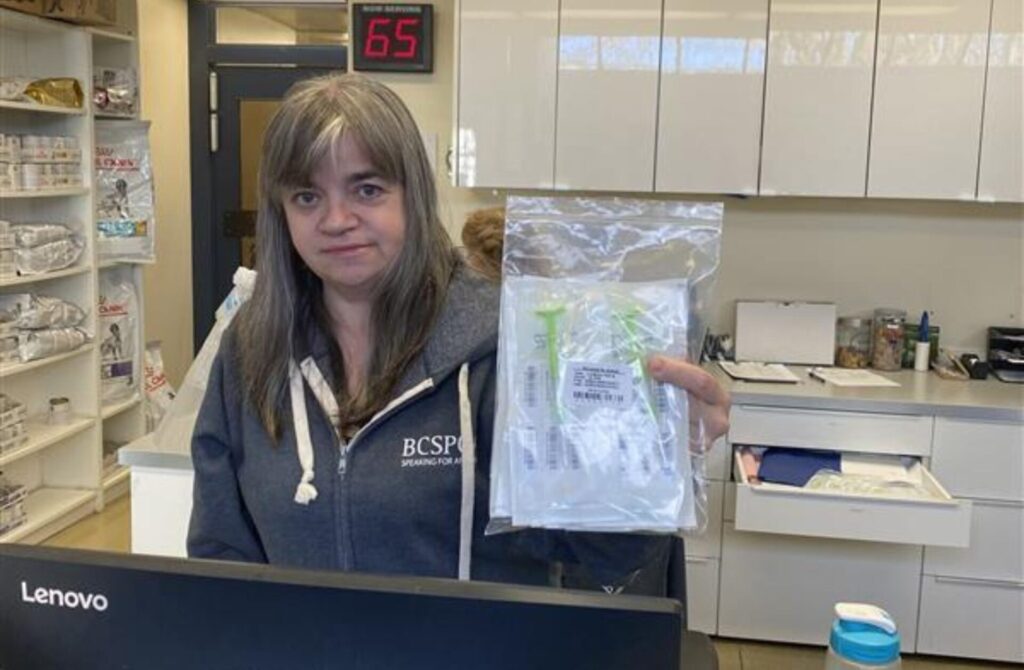Table of Contents
How Luna the Cat Got Lost During a Burnaby Thunderstorm
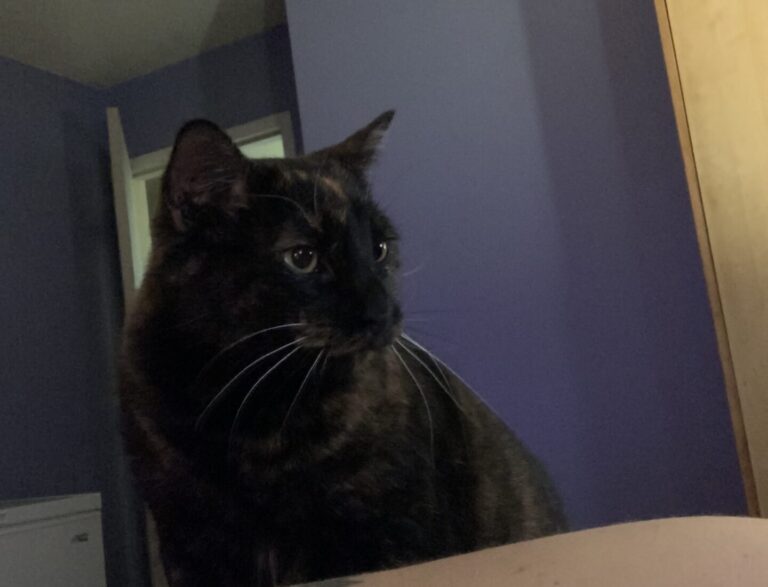
It was one of those nights when the sky feels alive.
Rain lashed against the windows, thunder cracked through the air, and flashes of lightning turned the streets of Burnaby white for a heartbeat at a time.
Inside, Dean and his wife sat in anxious silence. Their cat, Luna, hadn’t come home.
“My lovely tortie Luna used to be allowed outside,” Dean recalls. “That night, the storm rolled in, and afterwards, we couldn’t find her anywhere.”
They searched every corner of the yard, calling her name into the rain. Dean drove through the neighbourhood with headlights cutting through the downpour, while his wife walked block after block with a flashlight in hand.
Luna had never stayed out this long. Not once.
By morning, exhaustion and fear settled in. The storm had passed, but the ache of not knowing remained.
What to Do When Your Cat Goes Missing: Calling the SPCA
When the local Burnaby SPCA opened later that morning, Dean couldn’t wait another hour.
“I called out of desperation,” he says. “I even sent pictures. I just needed someone to know she was missing.”
He didn’t expect much to happen. After all, Luna was small and the city was big.
But sometimes, the world surprises us with a miracle.
Lost Cat Found by Good Samaritan and Brought to Burnaby SPCA
Two hours later, Dean’s phone rang.
“Within two hours, I got a call that a kind stranger found our little girl soaked and scared about a kilometre away,” he remembers. “They had taken her to the SPCA.”
The moment he heard those words, Dean didn’t think twice. He left work immediately, heart racing, praying it was really her.
When he arrived at the SPCA, Luna was waiting in the lobby, drenched, shivering, but safe.
“She looked up, and I knew it was her,” he says. “We had a tearful reunion right there in the lobby. I’ll never forget it.”
Why Bringing Found Pets to the SPCA Saves Lives
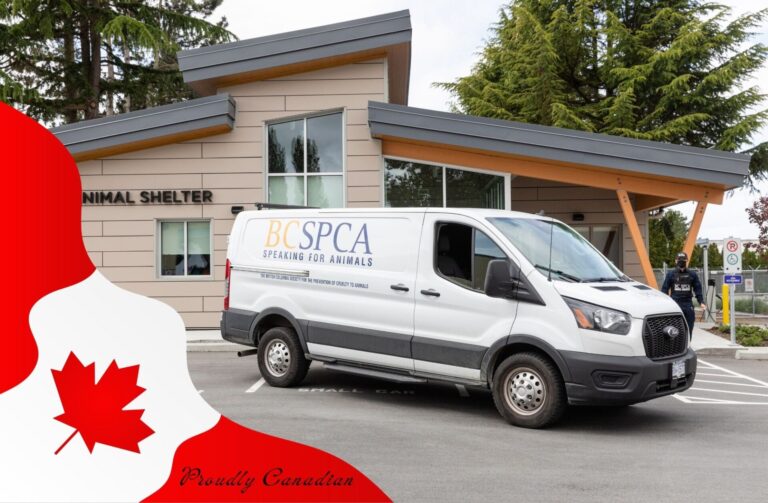
Dean never found out who the person was who rescued Luna.
“I never knew who the stranger was,” he says softly. “But they got us back together.”
Sometimes, that’s all it takes, one kind person who sees a frightened animal and decides to help. That anonymous act of compassion saved Luna’s life and gave her family one of the most emotional reunions they could imagine.
From Shelter Adoption to Storm Rescue: A Cat's Second Chance
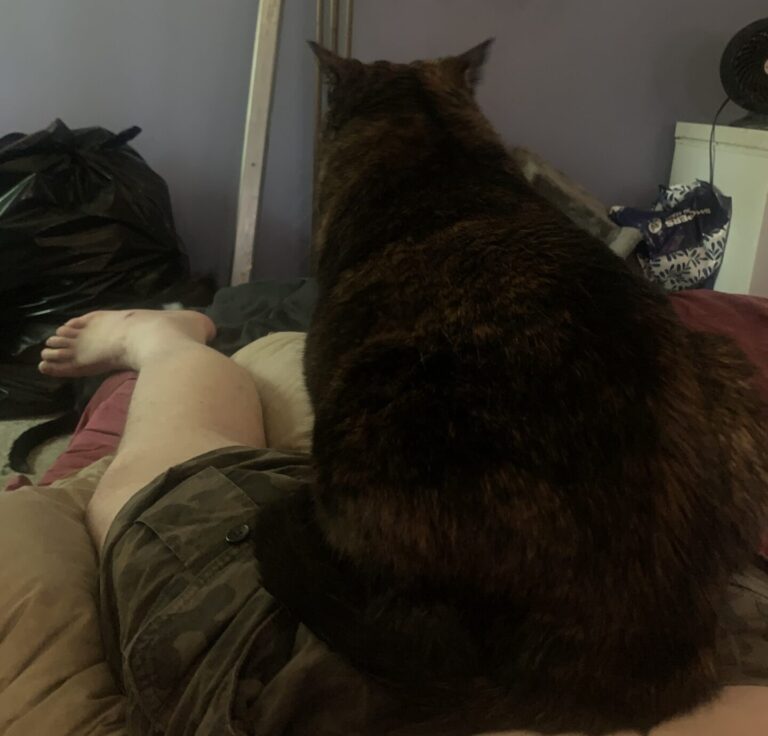
Luna’s story didn’t begin with that storm, it began long before, when she was first adopted.
“She’s my double rescue cat,” Dean shares proudly. “First from the shelter, and then again that night.”
Her story is a reminder that every adoption begins a journey of love, trust, and responsibility, and sometimes, that journey takes us right back to the start, when the pet we saved turns around and saves us.
How Microchips and Pet Registries Help Reunite Lost Pets in BC
Luna didn’t have a microchip or tattoo, but her reunion happened thanks to awareness, community, and quick action.
For every story like Luna’s, there are countless others that end differently. Identification, whether it’s a microchip, tattoo, or both, can make the difference between a lost pet staying lost and a joyful reunion.
When a pet is found, the BC Pet Registry provides veterinarians and shelters across the province with a secure and accessible database to contact guardians quickly.
A single scan or tattoo lookup can reunite a family within hours instead of weeks.
Even if your pet never goes outside, accidents can happen, an open door, a loud noise, a sudden storm. Permanent identification ensures they can always find their way home.
How BC Communities Help Reunite Lost Pets With Their Families
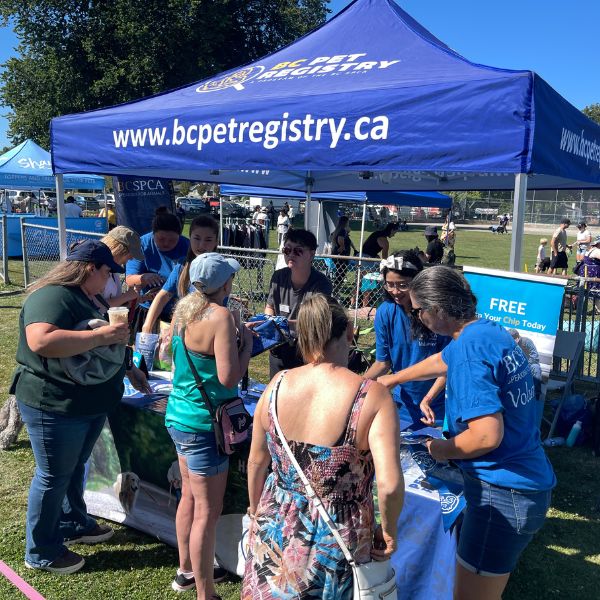
Luna’s story is also a testament to the power of community, the quiet, everyday heroes who look out for animals in need.
At events like Pet-A-Palooza Vancouver, supported by the BC Pet Registry, hundreds of families learn about the importance of microchipping, ID registration, and pet safety.
These gatherings remind us that protecting pets is something we do together, neighbours, shelters, veterinarians, and animal lovers all working hand in hand.
You can read more about that event here.
How to Protect Your Pet From Getting Lost: Essential Steps
Inspired by Luna’s reunion? Here are small steps that make a big difference:
- Register your pet’s microchip or tattoo with BC Pet Registry.
- Update your contact info regularly, especially after moving or changing phone numbers.
- Add a backup contact so someone can always be reached.
- Keep recent photos of your pet showing their unique markings.
Support your local SPCA or rescue, you never know whose Luna you might help bring home.
Be a Part of the 80% Responsible Owners
During our recent events, we scanned hundreds of pets, all with microchips implanted. Only to discover that approximately 20% of the pets’ microchips are not linked to any registries in North America. We recommend all pet owners to double check their pet’s registration and directly registering with us. All you need is the microchip number and/or tattoo code to start the online registration process. For a small, one-time fee of $45, your pet will be protected for a lifetime and you will also have contributed to the life-saving work of the BC SPCA.
Why Every Lost Pet Reunion Story Starts With Preparation
It’s been years since that night, but Dean still tells Luna’s story with gratitude in his voice.
“I’ll never forget how it felt when I saw her,” he says. “She was soaked, scared, and shaking, but she was home.”
That moment, the moment when fear turns into relief, when a family becomes whole again, is what every guardian hopes for.
And for every Luna still out there, there’s someone searching, someone waiting, and someone willing to help.
Because kindness, like identification, can be the bridge between lost and found.
FAQ
Q: What should I do if my cat goes missing in BC?
Contact your local SPCA immediately, file a lost pet report, and share clear photos. Search your neighbourhood during quiet hours (dawn/dusk), check under porches and in garages, and post on local lost pet Facebook groups. Register or update your pet’s microchip with the BC Pet Registry so shelters can contact you if your pet is found.
Q: How does the BC Pet Registry help find lost pets?
The BC Pet Registry is a robust Canadian pet database that links microchip and tattoo numbers to guardian contact information. When a lost pet is scanned at a vet clinic or shelter anywhere in BC, staff can quickly look up the guardian’s details and initiate a reunion—often within hours.
Q: Do indoor cats need microchips?
Yes. Even indoor cats can escape through an open door, window, or during emergencies. A microchip provides permanent identification that can’t fall off like a collar, giving your cat the best chance of being returned home.
Q: What should I do if I find a lost cat?
Bring the cat to any local SPCA, animal shelter, or veterinary clinic where they can scan for a microchip or look up a tattoo number. You can also check the BC Pet Registry’s found pet resources or post on local community groups to help locate the guardian.
Q: How long do lost cats usually survive outside?
Many lost cats survive for weeks or even months outdoors, though this depends on weather, traffic, and predators. Cats often hide nearby and may not respond to calls due to fear. Persistence in searching—especially during quiet early morning hours—is key.
Q: Is microchipping required by law in BC?
While microchipping is not provincially mandated in BC, many municipalities encourage or require it. Regardless of legal requirements, microchipping is the most reliable way to ensure your pet can be identified and returned to you.
Q: How much does it cost to microchip a cat or dog in BC?
Microchipping typically costs between $50–$100 at most veterinary clinics in BC. Some shelters and community events offer low-cost or free microchipping. Registration with BC Pet Registry is free for lifetime basic registration.
Q: Can I update my contact information on BC Pet Registry?
Yes. You can update your contact details anytime by logging in after registering an account with us. Keeping your phone number, address, and backup contact current is essential—outdated information is one of the most common reasons reunions are delayed.

